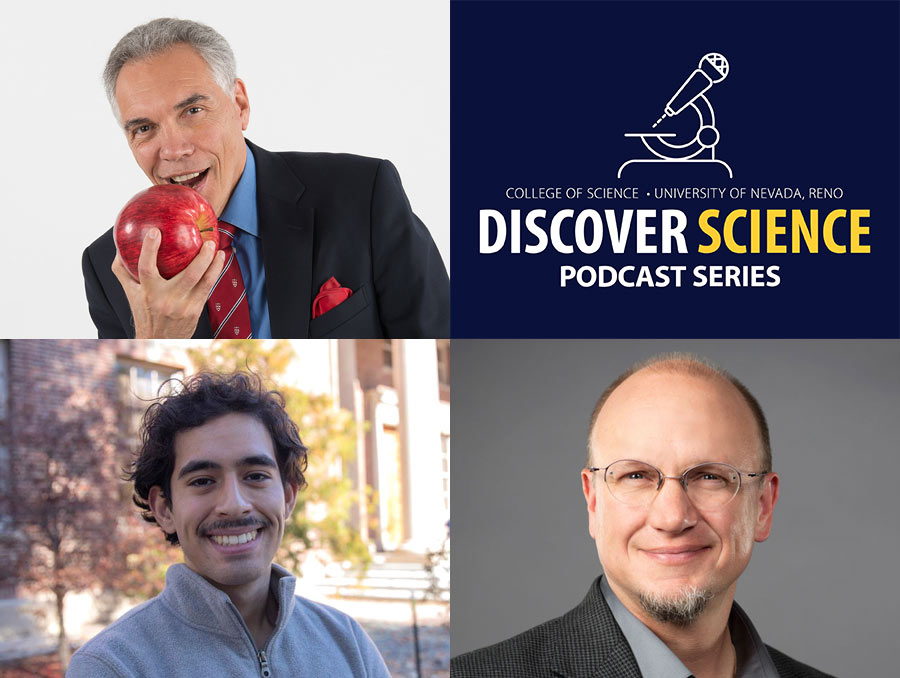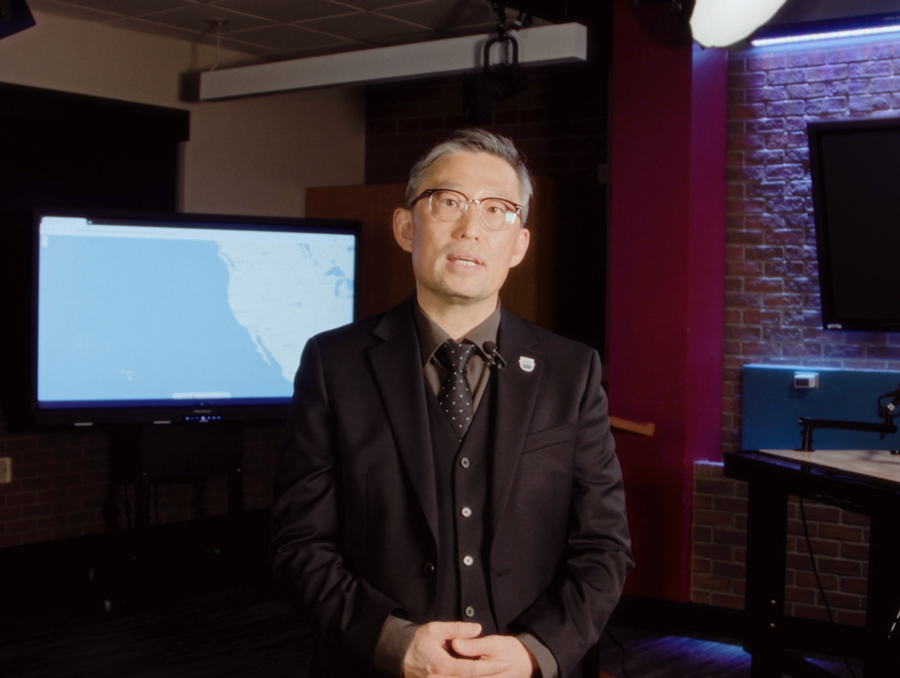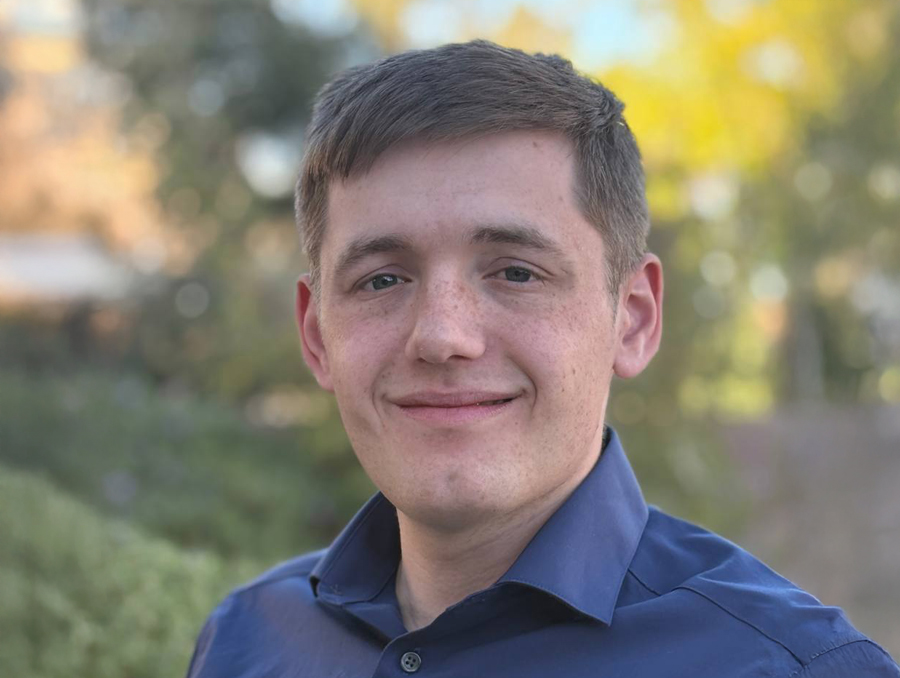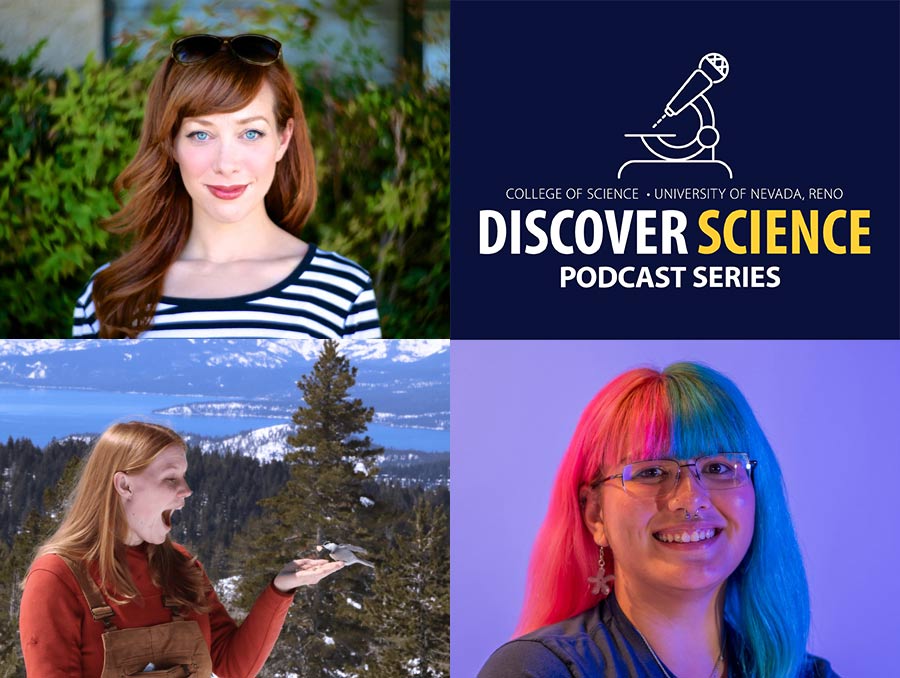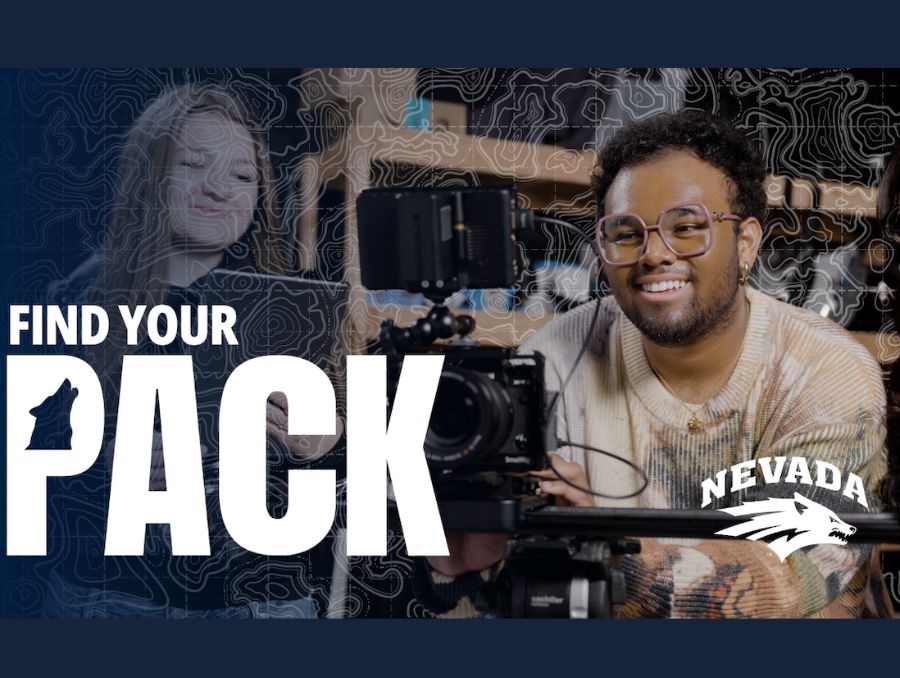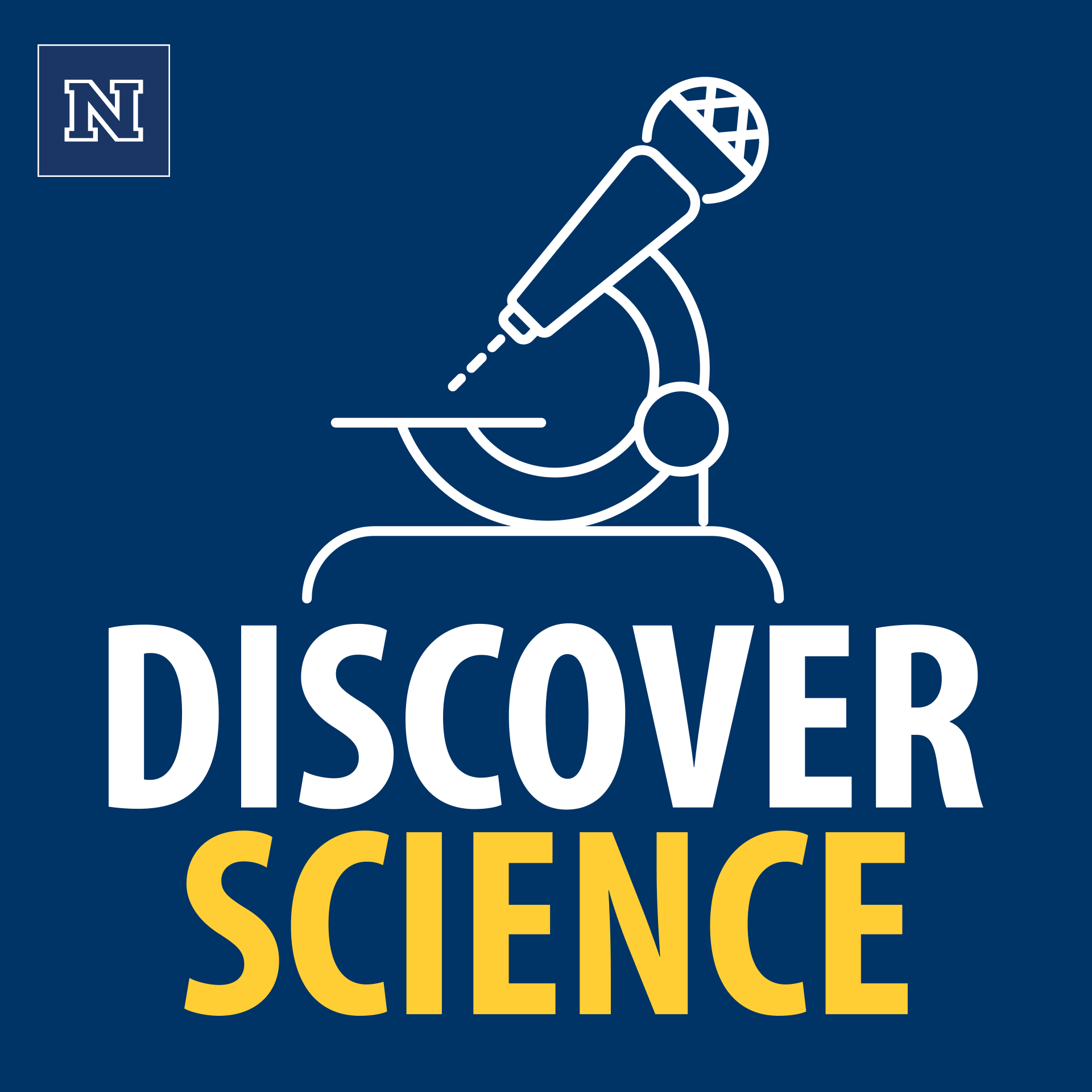
The advent of the internet has benefitted humanity in many ways. It has also caused some chaos, as people try to discern fact from fiction and sense from nonsense shared online. Many scientists have recently taken a more active role in helping society to understand how science works.
Joe Schwarcz is a professor of chemistry at McGill University and the director of the Office for Science and Society. Schwarcz has spent over four decades trying to combat misinformation, especially misinformation related to science. Schwarcz also hosts a radio show, “The Dr. Joe Show,” writes a newspaper column and has written 19 best-selling books.
Discover Science: Joe Schwarcz on the magic of chemistry
Discover Science Lecture Series speaker Joe Schwarcz is hosted by chemistry student Jesus Diaz Sanchez and chemistry professor Brian Frost.
On this episode of Discover Science, hosted by associate professor of chemistry Brian Frost and chemistry undergraduate student Jesus Diaz Sanchez, Joe Schwarcz speaks about what drew him to chemistry, how he got into magic, how to engage people in scientific topics and how to separate sense from nonsense.
About the lecture series
The Discover Science podcast is an offshoot fo the public lecture series by the same name. The Discover Science Lecture Series was founded by the College of Science in 2010, with the goal of bringing the country's top scientists to the University to share their knowledge, research and wisdom with the community.
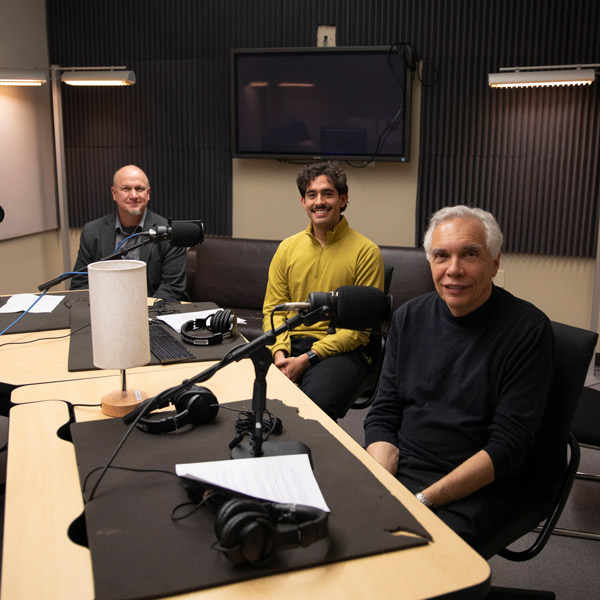
"Science encompasses a wonderfully diverse collection of explorations into the unknown. We invite science lovers and the science-curious to join us and experience the extent of the science universe as the best scientists on the planet visit the University of Nevada, Reno for our Discover Science Lecture Series," Jeff Thompson, executive vice president and provost of the University and founder of the Discover Science Lecture Series, said.
Past speakers in the series include astrophysicists Michio Kaku and Neil deGrasse Tyson; Robert Ballard, who discovered the wreck of the Titanic; and Bill Nye the Science Guy.
Brian Frost
Hello, everyone, and thank you for joining us. My name is Brian Frost and I'm a chemistry professor here at the University of Nevada, Reno.
Jesus Diaz Sanchez
And my name is Jesus Diaz Sanchez. I'm a chemistry student, and we're your hosts for this episode of Discover Science, a podcast spun off the Discover Science Lecture Series hosted by the College of Science. Thank you for coming in today. Welcome to the Discover Science Podcast. As a host of your own show, you must feel right at home.
Joe Schwarcz
Thanks very much. Yeah. I've sat in front of a mic before, although this one seems to be maybe higher quality than the one I’m used to.
Brian Frost
So you're director of the Office of Science and Society at McGill University. That's certainly an uncommon, if not unique office. So I wonder, how did how did the office at McGill come about and how did you get involved?
Joe Schwarcz
You're quite right. It is, it is unique. I don't know of anything quite like it at any other university. And it came about, it evolved, actually, it wasn't one day to the next. I'd always been interested in describing science and particularly chemistry to the public ever since, you know, I was very young, and when I finally got the chance to be in academia, I also started to get asked to give some public talks on science.
And I was, you know, I guess pretty good at it and started to get more and more questions asked and with a couple of colleagues going back to the 1980s, we organized some public lectures at the university and very much like the Discover series here, and the people would come and we did about ten of those a year and it kind of grew.
And there were more and more requests for stuff, and the university said, ‘You know, maybe we have something here. Let's try to formalize it.’ And this was in the late 1990s when already there was a lot of concern about misinformation and disinformation and the public being misled by pseudo experts. And that's when the office started. That was actually, it was in ’99, so we're getting close to 25 years. And then we were lucky enough to eventually get a benefactor, Lorne Trottier, who was an electronics expert and has an electronics company. And one day I was I was giving a public talk and he happened to be in the audience and he came up to me after the talk and he asked me a question that, that you don't normally get asked. He said, ‘Do you guys need any money?’
Brian Frost
It's a good question to get.
Joe Schwarcz
It’s a good question to get asked, you know, so I guess I hemmed and hawed a little bit, and said, ‘Well, you know, you can always use some, some money.’ And so I said, ‘Well, you know, I would like to fund public activities,’ and really, without much question at all, he gave us a very substantial donation. And so that enabled me to hire people, which, you know, we have a staff now about 6, 6 people, and essentially we try to separate sense from nonsense. Very challenging these days, you know.
Brian Frost
Absolutely. But important. That's a great, that's great office to have. So in addition to being a chemist, you're also a magician. And so I wonder, sir, how you got into magic and sort of how you balance magic, which appears to divide the natural world with your work as a scientist.
Joe Schwarcz
It's an interesting story and it goes back a long ways. It goes back to when I was in grade six, which was a few years ago, and I was invited to a birthday party where my friend's parents had hired a magician to entertain us as one does a birthday parties. And he was a teenager, not particularly good. But then he did a trick where he had a rope, which, obviously flexible, he had rolled up in his hand, and he said he was going to perform a miracle for us. He was going to make that rope defy gravity. And he reached into his pocket and, for what he said was a magic chemical, which he pretended to sprinkle on this rope. And sure enough, the rope then defied gravity. It was parallel to the ground.
It intrigued me. I mean, I knew even at that tender age, I knew this wasn't done with any magic chemical. You know, I knew that whichever way this defied gravity was done by some sort of mechanical trick, I wasn't aware of that. But I wondered why he had chosen those words, ‘magic chemical,’ you know, not hocus pocus or alakazam, you know, the traditional magic words.
And that intrigued me. And that actually turned out to be life-changing because I went to the school library, I took out a book on chemistry and took out a book on magic to see what all this was about and recognized that there was a parallel here, which at first sounds confusing because chemistry, of course, is a hard science firmly rooted in the laws of nature. Magic is the opposite. What do magicians do? You know, they levitate people, they cut women in half and put them back together again, right? Totally against the laws of nature. And I realized that that some of the scientific experiments that that are performed, you know, where you pour two liquids together and you get a change in color look magical to the uninitiated.
If you don't know anything about indicators and acids and bases, I mean, looks absolutely magical. But of course, in, in science, we try to take out the magic and provide the explanation, whereas a magician wants to hide what the explanation is, but it's always a scientific explanation. If someone is being levitated, you can rest assured they're being pulled from the top, pushed from the bottom or held from the back, right? But the audience, of course, isn't privy to how that is, is done. So that's how really I, I got interested and then I followed both of those. And, you know, sometimes I infused a little bit magic into presentations, first of all, because it's entertaining, but I never do it just for entertainment. I do it to make a point. And the point, you know, that you can obviously use with magic is that things aren't always the way they appear to be and that you can explain how something works scientifically and take out the, the magic. Of course, I don't go overboard in trying to reveal the magic, but there are some, some time when I think it's full value for doing it because it makes a point. So I followed both of those ever since.
Jesus Diaz Sanchez
How does your interest in both chemistry and magic help with your role in debunking pseudosciences?
Joe Schwarcz
Oh, I think magic is a great, great key because it teaches you skepticism, it teaches you trickery, you know, and how easy it is to trick people. So it certainly helps with, you know, unraveling all the, the quackery out there because you learn the, the methods that are used in magic, which are also some of the same methods that are used in the world of pseudoscience.
And it's, it's very irritating. Of course, you know, as, as a magician to see magic tricks used to defraud people. And this, of course, is something that has a long history. I mean, Houdini was adamant about fighting the Spiritualists in those days, who would do seances, have hands levitate and, you know, tables move about, all done with mechanical tricks. And, you know, he was one of the first to really have a campaign against this because fraud is fraud, and it cheats people. So, you know, learning what magic really allows you to look into trickery.
Jesus Diaz Sanchez
Could you share with us how you got interested in chemistry?
Joe Schwarcz
When I went to the library and, you know, took out a book on chemistry and started to read, you know, I realized that that chemistry was not just an intellectual exercise, that it was something that, that opened a door into understanding how the world works. Because everything works on the basis of molecules interacting. And if you have a feel for molecules, and molecular structure and chemical reactions, you have a pretty good feel for what can happen and what, what cannot. So to me, that was very revelatory. You know, it just provided a view into the workings of the world. And of course, the deeper you go into chemistry, the more you see how fascinating this is, and all of the things that you can control with chemical reactions and the subtlety, you know, that, that makes things possible, that, that, you know, when you learn that molecules that are mirror images of each other and may behave in different ways and, and how important that concept is. And, you know, you the more you read about chemistry, you see the beauty of it and you see the everyday connections. That's when I kind of realized that the real key to teaching chemistry was to show students why they should be learning chemistry, how it's relevant.
And, you know, I found early on when I first started teaching freshman chemistry and saw what some of my colleagues are doing is that they were teaching it as if all of the students were going to become professional chemists and that they had to be tortured to learn all of the excruciating details. And, you know, that's when I started to take a different approach because I realized that those who are really going to be interested in science are going to learn the nitty gritty details all the time anyway. But what is really important when you're talking to introductory students is to get them to appreciate what chemistry is and what it can do and what it cannot do to teach them chemical logic, to teach them how to think, you know, with chemical terminology so that they can interpret the chemistry in their daily life so that when they look at a list of ingredients in the shampoo bottle, they're not totally, you know, fear-stricken by that.
And they see that, yes, I mean, there may be some multi-syllabic names in there, but that doesn't mean that they're poisonous. You know, you, you don't judge a substance by the number of letters in its chemical name. So, you know, when I started to get into that and students, I think, liked it, they appreciated the modality and I think they started to go home and discuss some of these things around the dinner table at home. So then I started to get invitations to speak to parents groups and it kind of took off like that. But I would say that the real key from early on was to, to show the relevance of whatever they were studying in class, certainly not to trivialize the science, but show them the light at the end of the tunnel. So that there was a reason to struggle through that tunnel. And there might be a lot of curves in there, but there is a light at the, at the end, why they should be doing this. You know, I just, when I was talking to some of the students here, I just gave one of those, you know, examples that I remember, when I was doing some organic, I think it was in a general chem course, when I was an undergraduate, we had a third of the gen chem course that was organic. And one of the things I remember is the prof saying, ‘Well, now we're going to learn about amides, and we've got to learn how carboxylic acids react with amines to form amide.’ And he started to write the formulas and we learned it, of course. And then I decided, you know, when of course, after I knew a fair bit of chemistry, that when I was teaching organic, that's not how I would start electron amides.
I would start off by saying, ‘You've all heard of nylon, you've all known, you know something about it. You're probably wearing fibers now that were made of nylon. It helped turn the tide of the Second World War because of parachutes being made from nylon, etc. Well, what is a nylon molecule? How do we make it? Of course, it's made from carboxylic acids,’ and that's how you get into it. And then all of sudden, of course, they will learn the same thing. They will learn all of the details, they'll learn the mechanism of the reaction, but it becomes much more meaningful because they know where they are, are going. And also I remember being disenchanted by my second year, phys-chem course when I was an undergraduate, although I did reasonably well in it, because you learned how to plug numbers into the Earth equation and you know, all of this, and I remember that roughly about three quarters of the way through the course, the prof said something about, ‘Well, now you know how a battery works.’
He had, he had never mentioned the word battery before. We had no idea that all of this stuff that we were doing was essentially the chemistry of the battery and all that would have been necessary at the beginning is to say, you know, batteries are really important in our life. They have a fascinating history. You know, we can go back to the Volta and start this discussion and see how this has evolved and what we know today. It would have made all the world of difference. I would have still learned how to plug the numbers into the equation, but I would have known why I'm doing that. Right. So that's why I went, whenever I, whatever concept I teach, you know, in chemistry, I always think about that. You know what? Look, let me think about why it is that, why it is that they want to know this.
Brian Frost
And try to turn it into a story.
Joe Schwarcz
Absolutely. Absolutely. And if I can't think of a reason why they should know this, then they don't need to know it. So then I don't teach it.
Brian Frost
Fair enough. So in your radio show, you've been doing a radio show for, for quite some time, are there questions that seem to come up all the time? Are there myths that you feel like you're constantly debunking?
Joe Schwarcz
Oh, absolutely. I mean, over the years, of course, the type of questions have, have changed, you know. The, the questions about, you know, how to clean this, you know, how do you get the rust stain out of the bathtub and all of that, those have kind of withered away. Today questions tend to be more along the lines of, you know, is the vaccine safe or not?
I mean, people are concerned with health, with their, you know, everyday life. They're concerned with, you know, what is processed food doing to us? What, what, what does that mean? What is processed food? You know, why did California just ban red dye number three? You know, this this kind of stuff. So they the questions tend to be reasonable. And but of course, that also is because I'm speaking to, to an audience who's already interested in science. You know, it's, it's not the, the pseudo-science worshipers who are listening to my show. And also one thing that has changed is that now we have the ability to take text-in questions. And so that that now actually is more, more than people calling in online, because people have just gotten so used to texting. I mean, this is the way to communicate, you know, I mean, I see my students in the hallways sitting beside each other, texting each other, you know? So, so texting is, is the mode of communication now, which, of course, is also good in the sense that, that, you know, I have a screen in front of me and I see the text-in questions so I can pick and choose the ones I think are most interesting to, to talk about.
Brian Frost
Versus which phone call you have to pick up.
Joe Schwarcz
Absolutely. So, you know, the technology certainly has made an improvement. You know, and I mean, obviously sometimes there there are questions that that you don't have the answer to, although, you know, after doing this for 43 years, you've basically heard, you know, everything. But then you say, okay, well, you know, I'll talk about this next week. And I mean, these days, of course, there's almost nothing that you can't learn about in a week, you know, so you can dig out the, the information.
I also try to start each show with a couple of questions that they can then text in their answers or call in their answers. People like trivia, although it isn't exactly trivia. I mean, it's interesting chemistry-kind of questions that I try to come up with. It's not easy to come up with questions these days that you can't immediately Google, you know, But, you know, hopefully, I mean, they know that that really is not part of the game. I mean, the whole idea is to see, you know, do you know the answer to this?
So but but certainly as you as you were wondering, the the type of questions over the years have have changed. And whereas very early on, there was a lot of, you know, how things work, you know, how does lipstick work? How do antiperspirants work? Today, it's much more, ‘Is it risky? Should I be worried about it?’ Chemophobia has got you know, it's certainly become much more apparent than, than it used to be.
Jesus Diaz Sanchez
For me personally, when people ask about my research, I sometimes have a difficult time. I feel like I'm at a disadvantage slightly, just because the field of research I do in is computational work. So it requires a a bit of chemical theory knowledge. Sometimes it's hard to break it down to lots of individuals that may not have that background. But Dr. Frost, how would you explain that, your work to someone that perhaps hasn't studied that?
Brian Frost
Well, I think, you know, it's, it's, the answer when someone asks me what I work on, it sort of, the answer I might give varies a little bit on who I'm talking to. Certainly some of the stuff we do is complicated. And if I'm talking to people who aren't, aren't chemists, I think it's important to have sort of a elevator speech that you can kind of give, right? To talk about, you know, that we're trying to develop, say, water soluble complexes, to, to try to make more industrial processes with more benign solvents, for example, and that some, some things maybe they could understand. And so, you know, Dr. Joe would what do you recommend to scientists who want to show, that share their work with the public but maybe don't know how to start?
Joe Schwarcz
You really have to think your terminology through. And I've learned this over the years because I have sometimes guests, researchers, as guests. And, you know, we try to talk about their research and before they come on, you know, I preach to them about, ‘Make this simple. Remember that your language is very specific to you and that the terms that you use, which are innate to you, everyday language may be totally unfamiliar to the public.’ So if you're going to introduce some terms like that, make sure that you you describe it. I tell you honestly, it often falls on deaf ears, or maybe not on deaf ears, but they just don't realize how second nature that that language is. And you know that when you talk about transcription and translation, you know, I mean, to the average person, translation means translating from one language to another, you know. So you my advice always to, to scientists who are trying to communicate to the public, watch your language, define every, every term, assume that they know very little or essentially nothing, which is usually a correct assumption. Describe what you do in simple, simple, simple language and always tell them what is the end goal that you're trying to do. But it doesn't always work to give them that advice. You know, it's they can't get away from the complicated because they're just not used to talking, you know, everyday kind of language. And in some areas that's a bigger problem than in others because the language is, you know, much more specific and much more technical.
But, but everyone should be able to describe what they do in in a simple way. And in fact, if you can't do it, you probably shouldn't be doing your research because that means that you, you can't let people know what the, the end result of this is, that you're expecting.
Jesus Diaz Sanchez
I recently just heard a quote from Professor Sir Mark Walport. He said that science is not finished until it's communicated. Dr. Schwartz, how do you interpret this statement in the context of your own scientific work?
Joe Schwarcz
Oh, this is, you know, absolutely true. I mean, if you're working in a laboratory and you make some cosmic discovery, it is meaningless unless someone else finds out about it and usually builds upon it. Science is, is a series of very small steps. It's very rare that there is, you know, a single giant leap. I mean, that, you know, that's a romanticized version of science. It plods along with simple steps. Sometimes you have to take a step back and then you take another step forward. Well, those steps are the scientific publications, right? The way that you let your colleagues know what you've done is by writing it up and submitting it to a journal. Let the journals send it out to the referees, a lot of back and forth and eventually decided to merit publication or not. If it merits publication, then it becomes just one point in all the evidence that you try to gather and someone who's doing work in that particular field will look at it and usually criticize it or see what they can do with it and how to, to build upon it. And eventually you you get somewhere, you know, and, you know, one one quote that I really like of Isaac Newton's, who apparently was not a very nice guy, but when he was once asked how he had made so many discoveries and became so enlightened, he said, ‘It's because I stood on the shoulder of giants.’
And that really is is how science works. You're always building on what has gone on before. You're always adding to, to the knowledge. So that's why communication is, is so important. And I mean, sometimes, you know, people get, get credit, the Nobel Prize being a prime example, which is, you know, absolutely, absolutely the top prize in science. But you have to realize that behind that Nobel Prize there are hundreds of others without whose knowledge that would not have happened.
But you can’t give it to everyone at large, so you have to pick and select and, you know, sometimes it's controversial and sometimes, you know, it's, it's for making sort of one pivotal step. And that's what we had this year with the Medicine Nobel Prize for the COVID-19 vaccine to Katalin Karikó and Andrew Weissman. They didn't invent the vaccine. They didn't discover the vaccine, but they did make a very important contribution, probably a step without which it wouldn't have happened. But a step that someone else would have eventually come to, you know. But you got to select someone. So they looked at all the dozens and dozens of people who had been doing work on mRNA, and they decided that, you know, this was probably the most important contribution.
But even that is controversial, you know, because you can look at other steps and say, ‘Without that it wouldn’t have allowed us to actually do this.’ I was surprised that they didn't give it to a third person because there were many worthy candidates. But I think the problem was there were too many worthy candidates and they couldn't decide who the third person would be. Because these two had worked together and everyone agreed that this was really a pivotal step. And this wasn't very controversial, but there certainly could have been many who could have included, been included in that prize. So absolutely, communication is, is the key to the progress of science.
Jesus Diaz Sanchez
Fantastic. As a young scientist, do you have any advice for other also young scientists who struggle with effectively communicating their work to broad audiences given the complexity of their scientific work?
Joe Schwarcz
You have to work at it. Science communication is a specialty, just like anything else. You have to think about it. You know, you have to think about the words you're going to use. You have to think about the message that you're going to get across. Practice with your friends. If you're going to explain to them what it is that you're doing. There's no magic here. It, it comes with a can tell you it comes with years of experience. Because, you know, when, when I try to explain some things now, I certainly don't do it the way that I would have done a decade ago. You learn what works and what doesn't work. What doesn't work is to, to call people ignorant, even if they are. Nobody likes to be called ignorant. You have to kind of give them the rope to try to hang themselves. You know, if there's some controversial issue by, kind of, you know, emphasizing that maybe the information that they got, where did they get it from? And maybe it's not the best source. So it takes planning, you know, and it takes an interest in communicating. You know, you have to decide that you want to become a good communicator, that you're going to have to work at it.
Jesus Diaz Sanchez
So, Dr. Schwarcz, you're also a chemistry professor, a radio show host and a director of entire program, a bestselling author, and more. Recently on the Office of Science and Society's YouTube channel, you talked about doping in sports, quantum mechanics and, of course, tattoos. How do you find the time to explain complicated topics in just a few minutes?
Joe Schwarcz
Well, this is just what we were chatting before is that, you know, though, those few minutes come out of an hour of thinking, you know? And I mean, the same way that, you know, when you think about a research project, there's a lot the thinking behind it. So with the question of, of doping because we recently organized a whole symposium on doping. So of course, you, you look at the scientific literature, you explore it and you try to funnel it into understandable little bits. But I would say that that it takes a lot of reading, a lot of research in order to encapsulate it into short. You know, I remember that at one time I did some writing for The Washington Post and I was talking to the editor of the science page, which is where, you know, I was writing and he told me a story, said, ‘You know, once I didn't have time. So I wrote long.’ That's the thing, if you want to, to do it well and do it in a short, it takes a lot more time than to write a long piece.
Brian Frost
Interesting. You know, we've talked a lot about, you know, sort of pseudoscience and we've talked about your work in the Office of Science and Society. So what would you tell our listeners about why it's important for the public to understand science?
Joe Schwarcz
Whether they realize it or not, they're, they’re as scientists every day of their life. Because when you're making a decision about what to eat, whether you're going to eat a cook at home or eat some processed food, what cosmetics you're going to use, which medication you're going to take, is there a difference between Advil and Tylenol? You're making scientific decisions and you're making these every single day of your life without realizing that. And you're making decisions based on risk every day of your life without realizing that. You get into a car, you know that there's a risk. This is not a theoretical risk. This is a real risk. People die in cars. Nevertheless, you judge that the benefits outweigh the risks. So every day you're making scientific decisions. You're making decisions based upon risk. The only way that you can make sure that you're making the best possible decision is to have a background upon which you can base that decision. So you're not making a decision out of the blue. You're not listening to someone who has no business giving you advice. You are making the decision based upon your knowledge. And that knowledge doesn't come easily. That knowledge comes with, with education. You have to sometimes you have to sweat it. That's it. You know, it's anything that is worth having in life means that you've got to work for it.
Brian Frost
Excellent.
Jesus Diaz Sanchez
Given there's a distrust rapidly growing in the scientific community, whether, through a variety of topics, how can we help change the tide and help the public understand the importance of science and the difference between science and pseudoscience?
Joe Schwarcz
Well, I think by having programs by by, you know, creating needs for, for radio programs or television documentaries, for running courses for the public, for having public symposiums, I mean, the more exposure the, the better. And I mean, you're quite right in that that there is a, a certain distrust of science, especially of the pharmaceutical industry, which is, I think, totally misguided. But, you know, I mean, I hear all the time that, ‘You know, they really could cure cancer, but they don't want to cure cancer because they're making all of this profit from selling their ineffective cancer treatments.’ And I mean, this is such nonsense. And especially, you know, when you have some insight into pharmacy industry and, you know, the researchers, I mean, you know, this is such absurd. You know, let me tell you, there would be a lot of money to be made with a cancer cure, you know. But, you know, what is interesting is, on the one hand, you see all of this criticism of, you know, of scientists and the distrust. And on the other hand, they expect science to be able to do more than what it can actually do. They expect that science can come up with that cancer cure if only they chose to, to, to do it. You know, So it's this interesting view of, of, of the world. On the one hand, dissing science, and on the other hand blaming it for not putting its knowledge to the proper use.
Jesus Diaz Sanchez
Thank you for joining us today. Would you like to close this out the way you close out the Dr. Joe Show?
Joe Schwarcz
You know, this is sort of a conclusion that I arrived at over the years, and my signoff goes like this: I hope all the chemistry in your life comes out just right.
Brian Frost
Awesome. Thank you.
Jesus Diaz Sanchez
Thank you.
